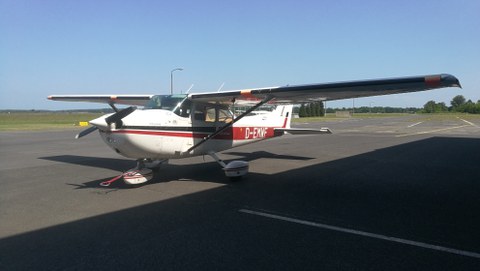Jul 13, 2023
Research above the sky: TU Dresden owns Saxony's only research aircraft
TU Dresden (TUD) has been owning the D-EMWF research aircraft since the end of May. This makes TUD the only scientific institution in Saxony to use its own aircraft for research purposes. Researchers at the Chair of Aircraft Engineering will now be able to strengthen their research in the field of innovative flight systems and technologies as well as test pioneering aircraft and propulsion systems on the research aircraft in collaboration with industry and research partners.
The single-engine Cessna 172 has a wingspan of just under eleven meters and has a total of four seats, one for the crew and three for additional passengers. The aircraft already comes with modifications adapted for research flights, such as removable wing end caps, appropriate technology in the wing to control measuring probes and an adapted baggage compartment to be able to transport special experimental equipment. The aircraft is stationed at the airfield in Kamenz - from there, flights lasting up to five hours can be made throughout Germany.
"We are very delighted that we can now call a research aircraft our own. This will make our research even more practical and we will be able to test and investigate new technologies directly on the object. We are also strengthening our education by using the aircraft in teaching and involving students in future research work on and around the aircraft," says Prof. Johannes Markmiller, Chair of Aircraft Engineering.
The research aircraft will be used, among other things, at the Smart Mobility Lab - the center for applied and fundamental research in the field of emission-free, intelligent, safe and multimodal mobility of the future at TUD's Hoyerswerda research campus. For example, the development of a high-precision control system for small aircraft in autonomous flight mode under blind flight conditions is intended to increase safety. Tests such as the automated docking and undocking of individual drones on aircrafts or the manual control of drone swarm flights from the cockpit, in which the aircraft is to be used as an interaction center, can thus also be carried out in the air under real conditions. The research aircraft will also play a pivotal role in future research into zero-emission flying. The development of a hydrogen engine for single-engine Cessnas is planned in a research project together with industrial partners and other TUD chairs, which will make a crucial contribution to environmentally friendly, CO2-free and efficient aviation.
Contact:
Manuel Reif
Chair of Aircraft Engineering
Tel: +49 351 463-38090

